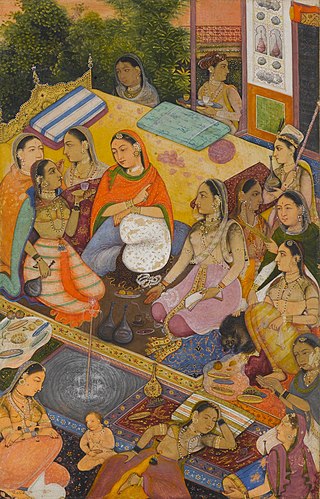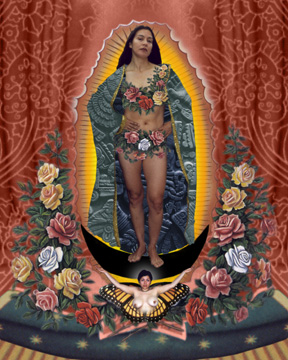Related Research Articles

Gender includes the social, psychological, cultural and behavioral aspects of being a man, woman, or other gender identity. Depending on the context, this may include sex-based social constructs as well as gender expression. Most cultures use a gender binary, in which gender is divided into two categories, and people are considered part of one or the other ; those who are outside these groups may fall under the umbrella term non-binary. A number of societies have specific genders besides "man" and "woman," such as the hijras of South Asia; these are often referred to as third genders. Most scholars agree that gender is a central characteristic for social organization.
Gender studies is an interdisciplinary academic field devoted to analysing gender identity and gendered representation. Gender studies originated in the field of women's studies, concerning women, feminism, gender, and politics. The field now overlaps with queer studies and men's studies. Its rise to prominence, especially in Western universities after 1990, coincided with the rise of deconstruction.

During both world wars, women were required to undertake new roles in their respective national war efforts. Women across the world experienced severe setbacks as well as considerable societal progress during this timeframe. The two world wars hinged as much on industrial production as they did on battlefield clashes. While some women managed to enter the traditionally male career paths, women, for the most part, were expected to be primarily involved in "duties at home" and "women's work," especially after the wars were over. On the other hand, the two wars also victimized women and subjected them to numerous incidences of sexual violence, abuse, and death.
Feminist archaeology employs a feminist perspective in interpreting past societies. It often focuses on gender, but also considers gender in tandem with other factors, such as sexuality, race, or class. Feminist archaeology has critiqued the uncritical application of modern, Western norms and values to past societies. It is additionally concerned with increasing the representation of women in the discipline of archaeology, and reducing androcentric bias within the field.
The historiography of World War II is the study of how historians portray the causes, conduct, and outcomes of World War II.

Maureen Patricia Duffy is an English poet, playwright, novelist and non-fiction author. Long an activist covering such issues as gay rights and animal rights, she campaigns especially on behalf of authors. She has received the Benson Medal for her lifelong writings.

Dame Helen Charlotte Isabella Gwynne-Vaughan, was a prominent English botanist and mycologist. During the First World War, she served in the Women's Army Auxiliary Corps and then as Commandant of the Women's Royal Air Force (WRAF) from 1918 to 1919. During the Second World War, from 1939 to 1941, she served as Chief Controller of the Auxiliary Territorial Service (ATS).
Feminism is a broad term given to works of those scholars who have sought to bring gender concerns into the academic study of international politics and who have used feminist theory and sometimes queer theory to better understand global politics and international relations as a whole.
The history of feminism in Canada has been a gradual struggle aimed at establishing equal rights. The history of Canadian feminism, like modern Western feminism in other countries, has been divided by scholars into four "waves", each describing a period of intense activism and social change. The use of "waves" has been critiqued for its failure to include feminist activism of Aboriginal and Québécois women who organized for changes in their own communities as well as for larger social change.
Clare Margaret Mulley is an English biographer of notable women. Her subjects have included Eglantyne Jebb; Krystyna Skarbek, aka Christine Granville; Hanna Reitsch and Melitta von Stauffenberg; and Elżbieta Zawacka.
Gender essentialism is a theory which attributes distinct, intrinsic qualities to women and men. Based in essentialism, it holds that there are certain universal, innate, biologically based features of gender that are at the root of many of the group differences observed in the behavior of men and women.

Women's history is the study of the role that women have played in history and the methods required to do so. It includes the study of the history of the growth of women's rights throughout recorded history, personal achievements over a period of time, the examination of individual and groups of women of historical significance, and the effect that historical events have had on women. Inherent in the study of women's history is the belief that more traditional recordings of history have minimised or ignored the contributions of women to different fields and the effect that historical events had on women as a whole; in this respect, women's history is often a form of historical revisionism, seeking to challenge or expand the traditional historical consensus.
Feminist metaphysics aims to question how inquiries and answers in the field of metaphysics have supported sexism. Feminist metaphysics overlaps with fields such as the philosophy of mind and philosophy of self. Feminist metaphysicians such as Sally Haslanger, Ásta, and Judith Butler have sought to explain the nature of gender in the interest of advancing feminist goals.

Lilian Bader was one of the first Black women to join the British armed forces.
Sonya Orleans Rose was an American historian and sociologist whose work focused on the cultural history of the United Kingdom and the British Empire in the 19th and 20th centuries. She was particularly known for her contribution to women's and gender history.
Claire Louise Langhamer, FRHistS, is a social and cultural historian of modern Britain. Since 2021, she has been director of the Institute of Historical Research.
Martin Francis is a British-American academic historian. He was Henry R. Winkler Professor of Modern History at the University of Cincinnati from 2003 to 2015, when he was appointed Professor of War and History at the University of Sussex.

The United Kingdom home front during World War II covers the political, social and economic history during 1939–1945.

The term Chicanafuturism was originated by scholar Catherine S. Ramírez which she introduced in Aztlán: A Journal of Chicano Studies in 2004. The term is a portmanteau of 'chicana' and 'futurism'. The word 'chicana' refers to a woman or girl of Mexican origin or descent. However, 'Chicana' itself serves as a chosen identity for many female Mexican Americans in the United States, to express self-determination and solidarity in a shared cultural, ethnic, and communal identity while openly rejecting assimilation. Ramírez created the concept of Chicanafuturism as a response to white androcentrism that she felt permeated science-fiction and American society. Chicanafuturism can be understood as part of a larger genre of Latino futurisms.
Penelope Summerfield, FBA, FRHistS, FAcSS, commonly known as Penny Summerfield, is an English historian and retired academic.
References
- ↑ "Royal Historical Society appoints Lucy Noakes as its new President from 2024". Royal Historical Society. Retrieved 21 January 2025.
- 1 2 3 "Profile for Lucy Noakes", University of Essex. Retrieved 7 February 2018.
- ↑ Gender and British National Identity in Wartime: A Study of the Links Between Gender and National Identity in Britain in the Second World War, the Falklands War, and the Gulf War, EthOS (British Library). Retrieved 7 February 2018.
- ↑ "Lucy Noakes", University of Brighton. Retrieved 7 February 2018.
- ↑ "Rab Butler Chair in Modern History appointed", University of Essex, 25 July 2017. Retrieved 7 February 2018.
- ↑ "List of Fellows – N", Royal Historical Society. Retrieved 7 February 2018.